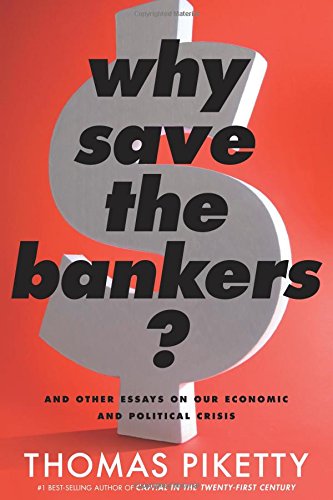What a stupid name for this collection of essays by economist Thomas Piketty. One would think it is an entire book of intensely ideological essays dedicated to rumination of whether we should have bailed out a corrupt financial industry. Instead, the reader is greeted with a series of opinion pieces written for a leftist French Magazine from 2008 - 2015. Written with both brevity and the authority given to a man whose career revolves around the study of capital as it pertains to major world powers, each piece offers insight on questions of inequality, globalism, taxation, trade, and even topics like terrorism or reparations for slavery.
The best part about reading WSTB was the timing I had in picking it up. Reading Piketty make plea after plea for a government that steps in to bail out citizens who are inevitably left behind by global capitalism (that global capitalism leaves many people in the lower and middle classes behind is an indisputable fact at this point, thanks largely in part to Piketty's work in Capital in the Twenty First Century) AND watching those citizens rebel against global capitalism with phenomenons such as Trump or the Brexit, offers unique validation to everything he was saying in real time. It's almost like reading a countdown to dangerous nationalist protectionism. What's more interesting is that Piketty's tome Capital in the Twenty First Century was long thought to be an arm of the far left, but it seems that Piketty believes in bailing out the banks, free trade agreements, and rapid technological advancement with the caveat that there must be strong social governments that work to redistribute the subsequent gains from global economic growth. After realizing that our world governments, for the most part, have been doing the opposite of what Piketty suggests doing at the time, it is amazing to look around and see everything he warned would happen if they don't; booming economic inequality, nationalist protectionism, distrust of governments, xenophobia, anti-globalism, and terrorism (which is actually the weakest piece, but the point is compelling and worth looking into at length).
The worst part about this books is mostly likely the decisions made by the publisher. The title and the exception of depth. If you're looking to read snippets as to why we might be where we are as an international community while maybe restoring your faith in a capitalism that could work for everyone, then this is a great and gratifying read. But if you're looking for depth, data, and a longer, more detailed timeline you should do yourself a favor and actually read Capital in the Twenty First Century all the way through. Then, ideally, publishers won't feel the need to push a sparknotes version like Why Save the Bankers.

